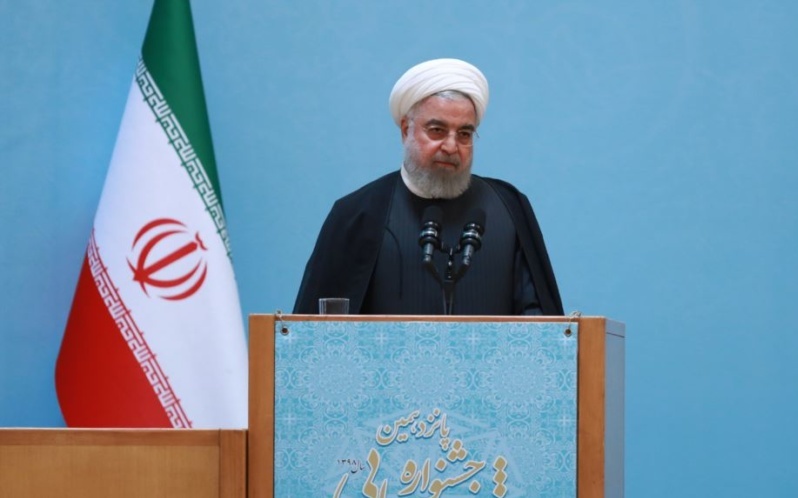Iran’s President Hassan Rouhani speaks at the Shahid Rajai Festival, Tehran, August 28, 2019
As Iran faces tension in the Persian Gulf, US sanctions, and economic crisis, President Hassan Rouhani has called on the regime to give him more authority.
Addressing an audience at a festival in Tehran, Rouhani began by speaking of Iranian resistance to the “maximum pressure” of the Trump Administration, which withdrew from the 2015 nuclear agreement in May 2018 and imposed comprehensive sanctions from November:
Despite various plots, the Imposed War [with Iraq in the 1980s] and the crimes by the Monafiqeen [“terrorists”] at the beginning years of the Revolution, people did not leave Imam Khomeini and the government.
We will manage the recent economic war against the Iranian nation through unity, resistance and management initiatives.
But he then carefully directed comments to other parts of the Iranian regime: “The monitoring body should be a help to the government. If interference sits instead of monitoring, the nation will be hurt.”
Rouhani was careful not to name a specific individual or group among Iran’s system of “supervisory bodies”, which include the Supreme Leader’s offices and representatives, the Guardian Council, and the Expediency Council, as well as a powerful judiciary, intelligence services, and military bodies such as the Revolutionary Guards.
Instead, he set out the caution, “If people feel suspicion, judgement and monitoring will lose their legitimacy. Administrative corruption will not be eliminated.”
In May Rouhani sought executive powers for the US “economic war”, citing the 1980s war with Iraq when a Supreme Council of War had authority over branches of government.
The spokesman of the Guardian Council, which can block legislation and candidates for elections, criticized Rouhani: “Iranian Presidents have always had extensive powers. Even more authority has been vested in the president in this presidential term in view of the country’s situation.”
When he became President in 2013, Rouhani was given a great deal of authority over the economy by Supreme Leader, as Ayatollah Khamenei sought a “firewall” to avoid blame for difficulties. The new President was soon able to convince the Supreme Leader to enter nuclear negotiations to avoid economic downfall.
But Khamenei has now established a High Council of Economic Coordination, in which Rouhani sits alongside judiciary head Ebrahim Raisi and Parliament Speaker Ali Larijani.
In his speech yesterday, Rouhani pushed against the judiciary, saying it should not have political bias in dealing with cases.
Judiciary head Raisi, who lost to Rouhani in the 2017 Presidential election, is seen as a conservative close to the Supreme Leader’s office.


“President Rouhani Complains About Lack of Authority”
Funny how democrats pick on trump for double talk but they don’t have any issue making agreements with people who can simply say it’s not me